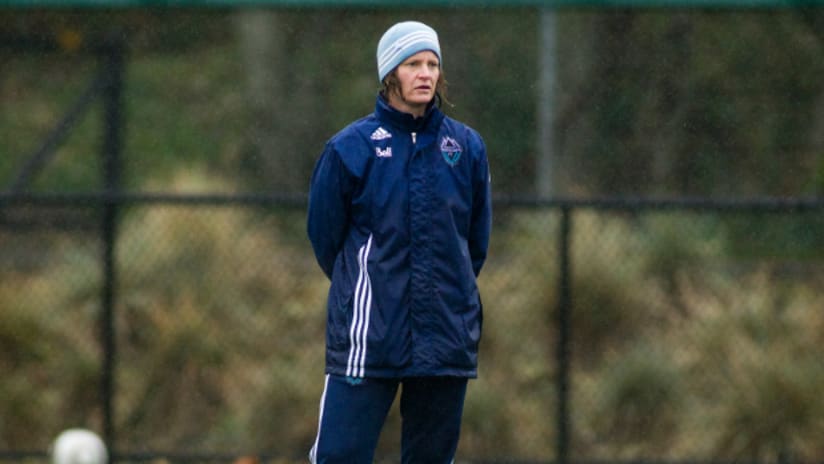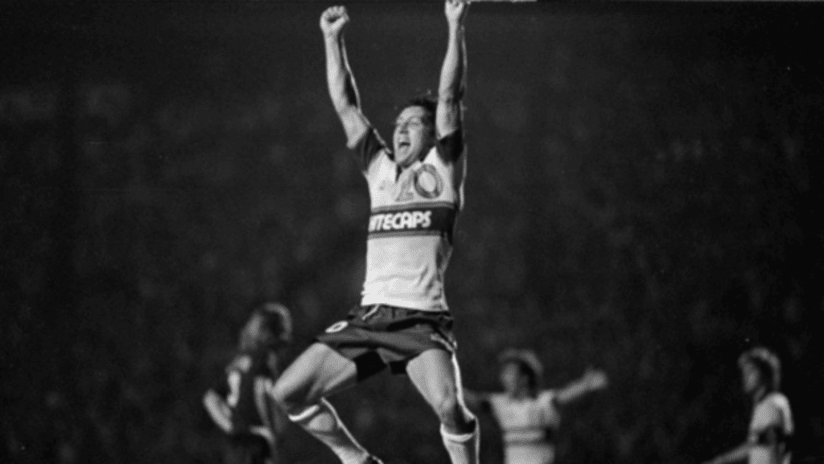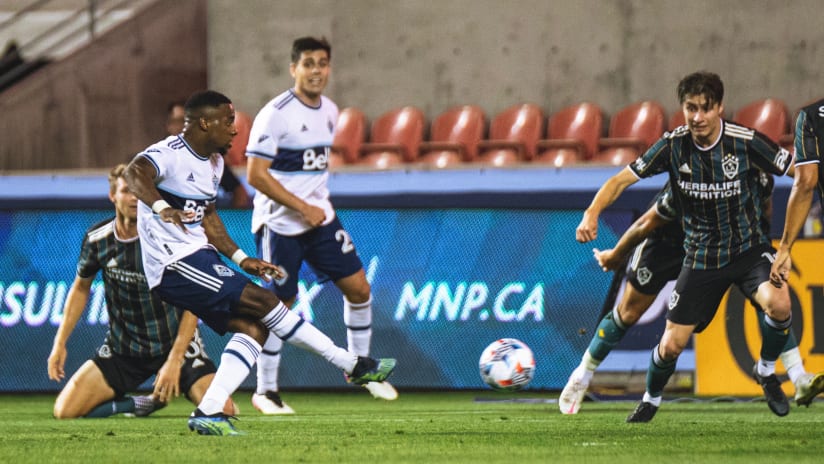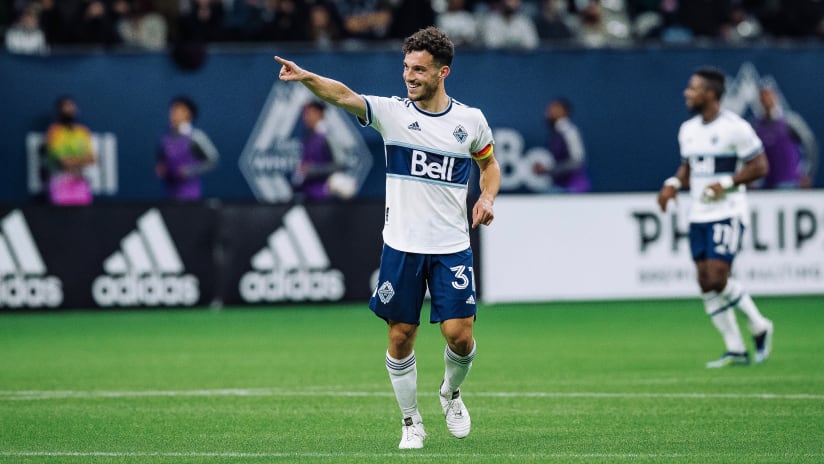On Tuesday, former Whitecaps FC women's team goalkeeper Sian Bagshawe was named to the Canadian women's national team staff for the 2012 CONCACAF Women's Olympic Qualifying Tournament in Vancouver, BC. In addition to her duties with the national team, Bagshawe has been working as goalkeer coach for the 'Caps U-18 Girls Elite team. Last week, the native of North Vancouver took some time out of her busy schedule to chat with whitecapsfc.com:
You played for Whitecaps FC for several seasons, what was your experience like?
From 2003 to 2006, it was a really great time because there was a lot of support from the community. We had a lot of people coming to our games because we had such a solid base of local players who were also national team players. Not to mention – because of the elite level of players on the team – it was just a great group of players to train with, learn from and compete with on a daily basis. One particular memory I have with that team came in 2003 when we played the Seattle Sounders women’s team in the new Seahawks Stadium (now called CenturyLink Field) which had just been built. It was a double-header with the men’s team and we opened with the first match. There were over 20,000 fans there and it was just such an amazing atmosphere. Even though we ended up losing in overtime, it was still an incredible experience.
How important is it to have an elite women’s soccer team here in Vancouver?
I think it is extremely vital because it gives the girls who are playing role models to look up to, both on and off the field.As well, you’re able to link those players to the community through running sessions for other clubs.Furthermore, having an elite women’s soccer team gives female athletes more options in how they would like to spend their playing career.For example, I remember when it used to be just the national team or college and university teams to choose from and now, with programs like the ones Whitecaps FC have, athletes can train at a more elite level on a year-round basis.
What is your current role with Whitecaps FC and what does it entail?
I’m currently working as the goalie coach for the U-18 Girls Elite program; I assist Carrie Taylor in three of the five weekly sessions.Also, I am one of the goalkeeper coaches for the ‘Caps GoalKeeper Academy, which is organized by Raegyn Hall and held on Friday nights.
How important is it to have a program like Whitecaps FC Girls Elite?
I believe it’s very important to have a program like Whitecaps FC Girls Elite because in order to make it to the top level as an athlete, you need to be training in an environment where you’re with the best players in your age group and are consistently competing in games.However, that can sometimes be difficult for the current group because they are all the best players at their level which can make it hard to find teams that will play you.But on the flip side, that means they are always training and competing at a higher level because they are often competing against women’s teams instead of their own age group.Training and competing at such a high level is vital for the girls to be noticed by the national teams and the CIS and NCAA teams.
You’ve been working with the Canadian women’s national team as well, can you tell us about what you’ve been up to?
I’m an apprentice coach with the national team.I was fortunate enough to receive a grant from the Coaching Association of Canada through their ‘Women in Coaching’ program, which allows me to be part of the women’s national team programming.My role is to assist with the video analysis and I also assist with the managerial side of the program.
How did you get into coaching?
I started coaching midway through university at UBC.I began by assisting in a few goalkeeper sessions that the former goalkeeper coach of the national team was running through his private goalkeeper academy.Then, I assisted with his sessions and evolved from there.I really enjoyed coaching at that point and started running some of my own sessions a few years later.I then worked for various academies around the lower mainland throughout the years, which eventually led me to work for Whitecaps FC and the national team. I believe it’s really important to give back and I think you can do that as a coach and really have an impact.For example, I remember growing up and not having a goalie coach until I was in grade 12, so to be part of the movement to change that is huge.It truly does make a difference for youth goalkeepers to be trained with the right technique and just to be able to have someone there to focus on their position.
What do you enjoy most about coaching?
My favourite part about coaching is getting the opportunity to see a player really start to reach their potential or even just to improve in general.Coaching is never about the coach, it’s always about the player and the ups and downs they go through in their journey to perfect their skills and abilities.As well, getting them to understand the bigger picture of the game – the tactics, the philosophy – because when you get to a certain level, everyone can throw the ball and catch the ball but it’s those intangibles – like their ability to read the game, their motivation and leadership ability – that’s what sets the elite players apart from the rest.
As a coach, what kind of approach do you take?
I think when you give feedback it depends on the age and the level of the player.For instance, if it’s a development level player, it’s about giving feedback in a very positive way.As the players get older, you can be more constructive with feedback as a coach.For example, when I’m working with Whitecaps players, I can be more direct with them but it’s important to still be conscious that I’m not crushing them every time.I think it’s vital as a coach and a goalie coach to be able to read the players that you’re dealing with because they all take information differently.
What advice do you have for young players who aspire to reach an elite level?
I think it’s important to set goals and really work towards them because there’s not one set pathway to get to their goal.However, it’s not about quantity or training; it’s about quality and being able to work effectively and efficiently.
Which other coaches do you look up to?
I really look up to Whitecaps FC staff goalkeeper coach Raegyn Hall, who is both a peer and someone I really respect.As well, Shel Brodsgaard is someone whose coaching style I admire.Andrea Neil would also be on that list, as I’ve looked up to her since I was 17-years-old and she was my coach at UBC.Finally, one of the former goalkeeper coaches of the national team, Max Colucci, was someone I learned a lot from in terms of the Italian way of coaching, which is very technique-based and something I try to incorporate in my coaching.
What advice do you have for other coaches?
Always be open to learning new things and communicating with other coaches.Learn everything you can both on and off the field about the game, to adapt and grow, and to use everyone as a resource instead of staying in just the coaching bubble.
What do you hope to accomplish over the next few years as a coach with both Whitecaps FC and the national team?
With Whitecaps FC, I look forward to being involved and helping the brand be the best it can.I have been a Vancouverite since I was three-years-old and it’s very important to me, personally, to give back to the club that has been so good to me over the years.
With the national team, I’m just looking forward to being a part of the team going into Olympic qualifying here in January. Looking more long term, being part of hosting the U-20 World Cup in 2014 as well as the Women’s World Cup in 2015 is something that would mean a lot to me. Especially the Women’s World Cup because it’s taking place on home soil and is sure to make an impact from the grassroots level up to the elite level.





